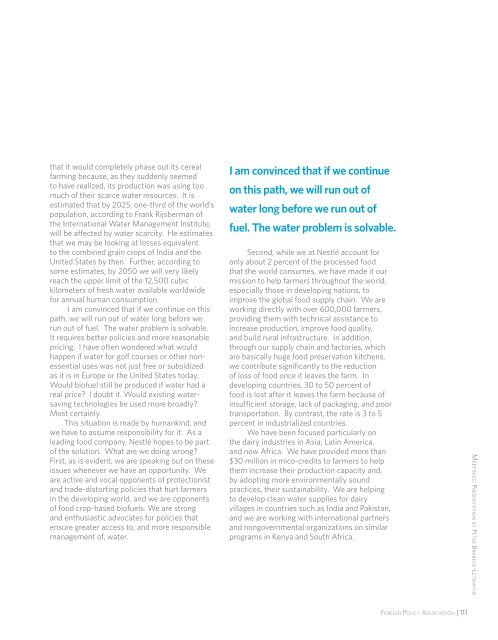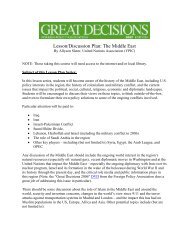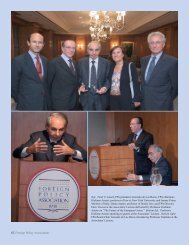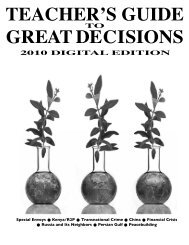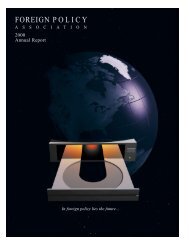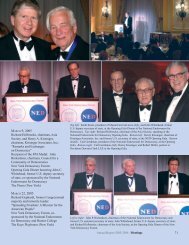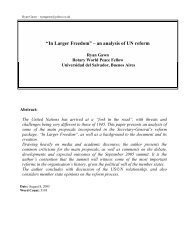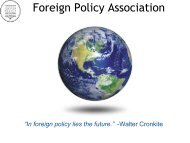Celebrating 90 Years - Foreign Policy Association
Celebrating 90 Years - Foreign Policy Association
Celebrating 90 Years - Foreign Policy Association
Create successful ePaper yourself
Turn your PDF publications into a flip-book with our unique Google optimized e-Paper software.
that it would completely phase out its cereal<br />
farming because, as they suddenly seemed<br />
to have realized, its production was using too<br />
much of their scarce water resources. It is<br />
estimated that by 2025, one-third of the world’s<br />
population, according to Frank Rijsberman of<br />
the International Water Management Institute,<br />
will be affected by water scarcity. He estimates<br />
that we may be looking at losses equivalent<br />
to the combined grain crops of India and the<br />
United States by then. Further, according to<br />
some estimates, by 2050 we will very likely<br />
reach the upper limit of the 12,500 cubic<br />
kilometers of fresh water available worldwide<br />
for annual human consumption.<br />
I am convinced that if we continue on this<br />
path, we will run out of water long before we<br />
run out of fuel. The water problem is solvable.<br />
It requires better policies and more reasonable<br />
pricing. I have often wondered what would<br />
happen if water for golf courses or other nonessential<br />
uses was not just free or subsidized<br />
as it is in Europe or the United States today.<br />
Would biofuel still be produced if water had a<br />
real price? I doubt it. Would existing watersaving<br />
technologies be used more broadly?<br />
Most certainly.<br />
This situation is made by humankind, and<br />
we have to assume responsibility for it. As a<br />
leading food company, Nestlé hopes to be part<br />
of the solution. What are we doing wrong?<br />
First, as is evident, we are speaking out on these<br />
issues whenever we have an opportunity. We<br />
are active and vocal opponents of protectionist<br />
and trade-distorting policies that hurt farmers<br />
in the developing world, and we are opponents<br />
of food crop-based biofuels. We are strong<br />
and enthusiastic advocates for policies that<br />
ensure greater access to, and more responsible<br />
management of, water.<br />
I am convinced that if we continue<br />
on this path, we will run out of<br />
water long before we run out of<br />
fuel. The water problem is solvable.<br />
Second, while we at Nestlé account for<br />
only about 2 percent of the processed food<br />
that the world consumes, we have made it our<br />
mission to help farmers throughout the world,<br />
especially those in developing nations, to<br />
improve the global food supply chain. We are<br />
working directly with over 600,000 farmers,<br />
providing them with technical assistance to<br />
increase production, improve food quality,<br />
and build rural infrastructure. In addition,<br />
through our supply chain and factories, which<br />
are basically huge food preservation kitchens,<br />
we contribute significantly to the reduction<br />
of loss of food once it leaves the farm. In<br />
developing countries, 30 to 50 percent of<br />
food is lost after it leaves the farm because of<br />
insufficient storage, lack of packaging, and poor<br />
transportation. By contrast, the rate is 3 to 5<br />
percent in industrialized countries.<br />
We have been focused particularly on<br />
the dairy industries in Asia, Latin America,<br />
and now Africa. We have provided more than<br />
$30 million in mico-credits to farmers to help<br />
them increase their production capacity and,<br />
by adopting more environmentally sound<br />
practices, their sustainability. We are helping<br />
to develop clean water supplies for dairy<br />
villages in countries such as India and Pakistan,<br />
and we are working with international partners<br />
and nongovernmental organizations on similar<br />
programs in Kenya and South Africa.<br />
FOREIGN POLICY ASSOCIATION | 111<br />
MEETINGS: PRESENTATION BY PETER BRABECK-LETMATHE


